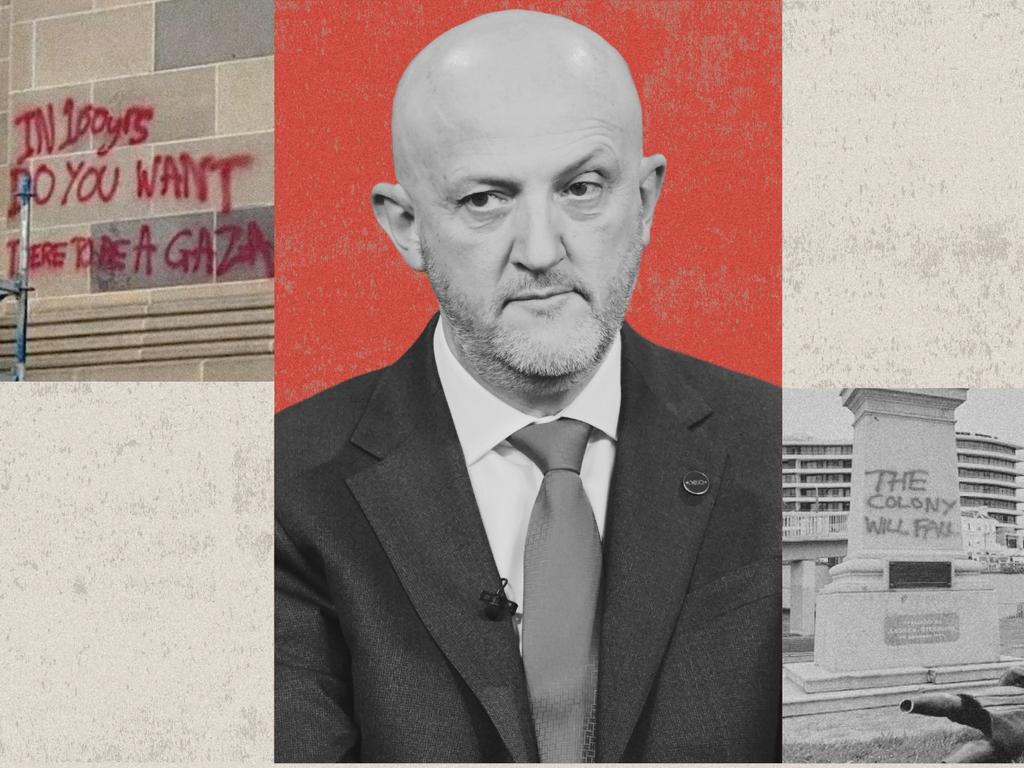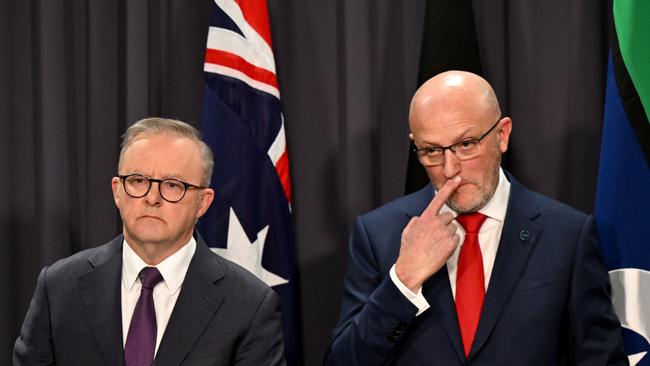
The government’s announcement increasing the terrorism threat level to probable is sobering but, frankly, long overdue. The Australian government is surely the last sentient entity anywhere to work out that the terrorism threat has increased since the Hamas atrocities on October 7 last year.
Several aspects of the announcement are baffling, if not completely incoherent.
The government is right to talk about today’s online environment radicalising people more quickly. It’s also right to talk of the consequent speedier move to violence. And of the terrorist recruits getting younger. It’s also right to register, though it did so only in answer to questions, the potential impact of artificial intelligence on terrorism. And, although it did this too only in answer to questions, to acknowledge the role of hostile governments in using social media to exacerbate social tensions and reinforce extremist movements that can lead to terrorism.
But all that is obvious. I could have written the government’s announcement for it any day over the past nine months. There’s no surprise for anyone half awake in any of that, though it’s still good for the government to say it. But some of the detail of the government’s announcements were, as Kamala Harris might say of Donald Trump, just “weird”.
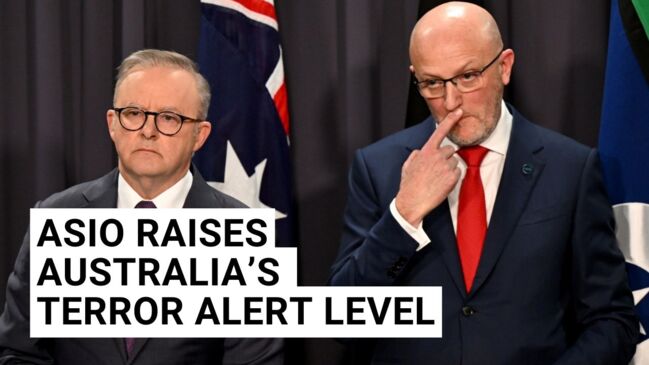
Let me explain. Australia is lucky to have Mike Burgess as the director-general of ASIO. He’s an outstanding leader of ASIO and a dedicated servant of Australian security. I’m sure he doesn’t say anything at a press conference, or anywhere else, that he doesn’t believe to be true. But his words in this announcement had that tortured, tenuous, elongated, hangdog quality of civil service sentences when the agencies of government are attempting to accommodate intractable reality to a particular government’s perverse political needs.
The government still seems to be at pains never to mention Islamist extremism, which remains the primary threat of serious terrorism in all Western societies, and in the Middle East and North Africa, and indeed in Southeast Asia. There is also a growing threat of right-wing terrorism in Western societies.
The greatest act of mass terrorism in recent years is the slaughter by Hamas, a group recognised and proscribed in Australian law as a terrorist organisation, of hundreds of Jewish Israelis and some other foreign nationals, on October 7. Terrorism doesn’t cease to be terrorism merely because the target is Israeli.
For example, Burgess, in words of Jesuitical obscurity and logic chopping, says the Gaza conflict is a driver of extremism in Australia but not a cause of extremism. It’s a driver of factors that led to the increased terrorist threat level, but not the cause of the increased terrorist threat level.
Got that? Feeling reassured?
The reaction of Australians to Gaza, specifically, presumably, some Australian Muslims, is a driver of extremism but not a cause of extremism. And if you can work that out, there’s a career for you as an ASIO cryptographer.
It all looks like a desperate attempt to avoid saying anything remotely disobliging in any way to any Muslim who may be in Australia.
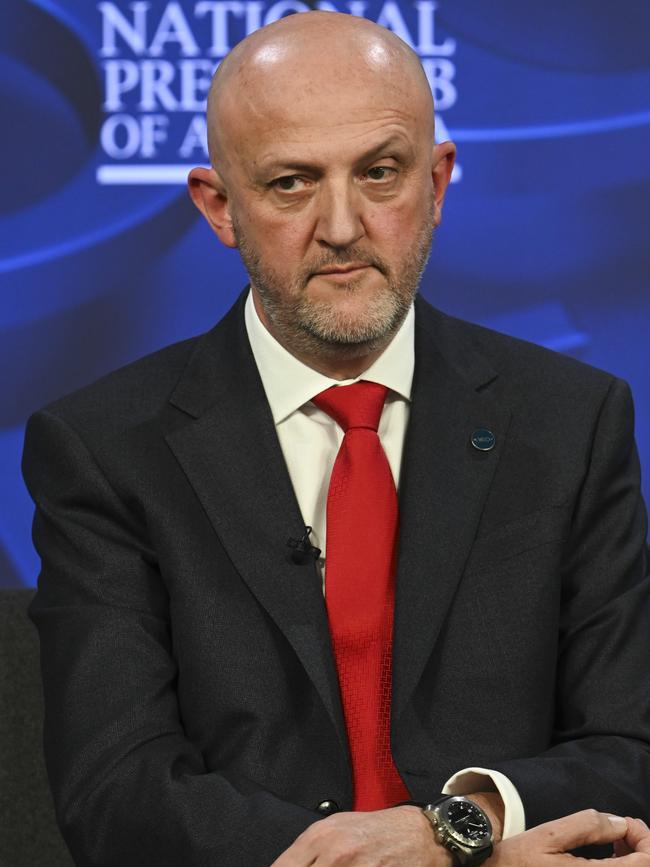
Yet the simple truth is that the overwhelming majority of Australian Muslims are law-abiding, sensible people. But a dangerous minority have embraced extremism, sometimes including the glorification, justification or actual carrying out of violence, that is, terrorism.
But the Albanese government is terrified of losing the support of Muslim voters because it had the temerity to denounce, albeit as softly as possible and with as many equivocations as possible, the Hamas terrorism against Israelis. Everything the Albanese government has done in this space has the appearance of being wretchedly political.
Government agencies also seem to have discovered a new catch-all term, “politically motivated violence”, which will now embrace all terrorism and lots of other things as well. This again seems to be an effort by the government to bend language to politics. Under Malcolm Turnbull, Australia confronted Islamist terrorism, the correct term. Scott Morrison was looser with his language. He referred to Islamic terrorism, which I think was an unfair term. Islam is a religion. Islamism, which may be non-violent, is the view that politics should be ruled by the Islamic religion. Violent Islamist extremism is the view that violence and terrorism are justified in bringing this about. They are three separate categories.
During the Morrison government, the agencies, and the government, switched terms to talk of religiously motivated violence, so as not to mention Islam. Burgess would occasionally talk of Sunni extremist violence. However, the leadership of Australia’s Islamic communities continued to campaign against even this degree of linguistic honesty.
They’ve apparently succeeded in censoring the government, which will now call everything politically motivated violence.
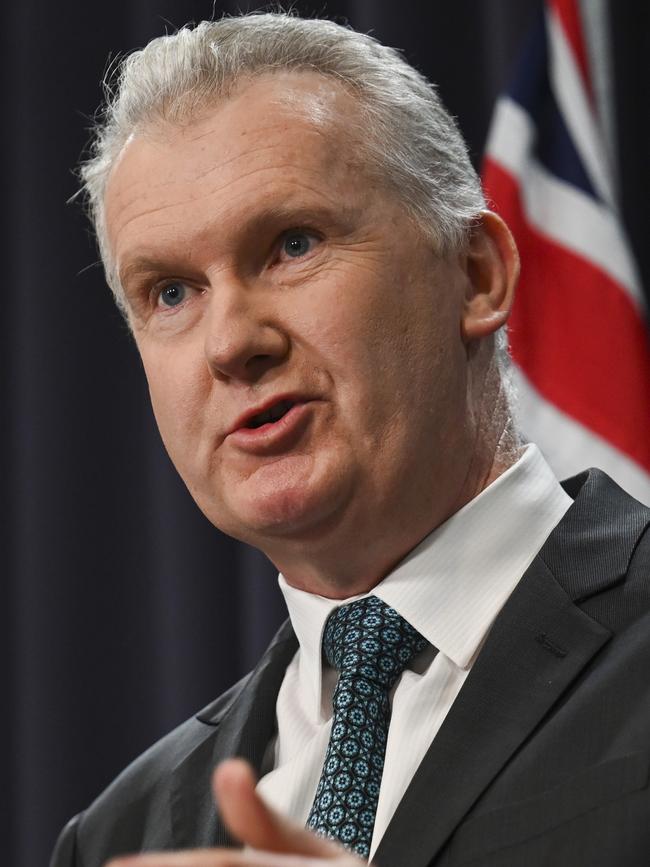
The other truly weird element of Burgess’s remarks was this: “There’s plenty of anti-Semitism, but there’s plenty of Islamophobia at the same time. It’s kind of, almost, equal treatment. Not quite, but almost equal treatment.”
What? If Burgess actually believes this he must be living in a different country, though the remark is tremendously useful to the government. What about the facts?
People of Islamic background have been arrested and prosecuted for threatening and planning to kill Australian Jews. How many Jews have been arrested for threatening or plotting to kill Australian Muslims? Synagogues have been subjected to demonstrations and intimidation. Has this happened at mosques? A long series of demonstrations, including at universities, systematically showcased anti-Semitic slurs and stereotypes. Where are the equivalent anti-Islam demonstrations?
I don’t want anyone to denigrate Islam. But to equate Islamophobia in Australia with anti-Semitism is simply a denial of reality. If there was some technical measure Burgess was referring to, such as the number of hostile references to Muslims and Jews, on the internet overall, he should have been explicit. The social situation his words describe is simply not reality. When politicians, or agency heads, ask voters to believe something that flies in the face of what they can plainly observe every day, that’s when institutions lose credibility.
The other weird aspect of the announcement, as the opposition’s James Paterson has pointed out, is that Home Affairs Minister Tony Burke was not there. It’s a very good thing that ASIO has been taken away from Home Affairs and returned to the Attorney-General. But Home Affairs still, notionally at least, has all kinds of policy responsibilities for national security.
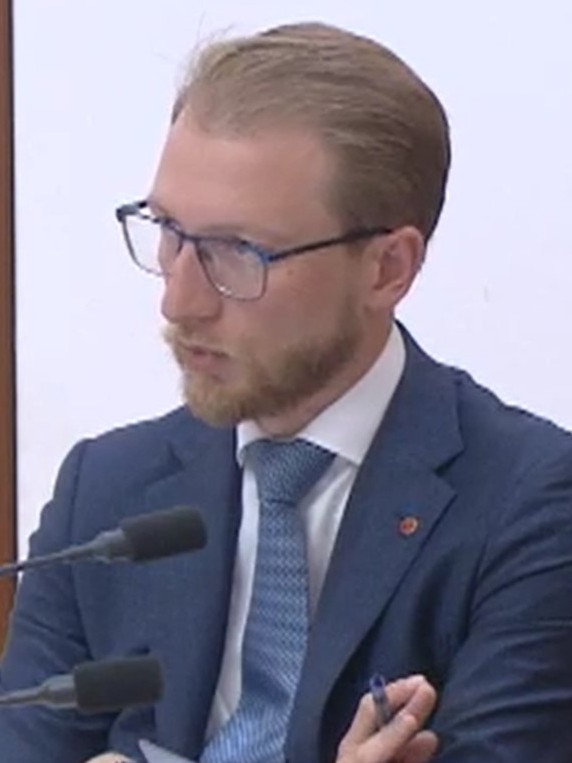
If raising the national threat level of terrorism from possible to probable doesn’t involve the Home Affairs Minister, the name of the ministry should be changed and its remaining national security responsibilities, except perhaps for Border Force, should be returned to the Prime Minister’s Department.
Burke’s appointment as Home Affairs Minister is in any event bizarre. He was among the most disgraceful politicians in responding to the Hamas terrorist atrocities, refusing for the longest time to unequivocally condemn the Muslim leaders in his own electorate who rejoiced at the Hamas murders or otherwise engaged in anti-Semitic diatribes.
Maybe a senator, immune to constituent ethnic group pressures, should hold Home Affairs. But if there was one single member of the cabinet who should not be given Home Affairs, it’s Burke.
One element of national security is judging carefully who gets to come here permanently. This doesn’t just mean security checks – little more than running names through data bases. It also means being prudent about accepting people from societies with radicalised populations. This has been accepted practice for years. Will Burke do that?
This government is feeble on national security because its lens is exclusively electoral politics.



